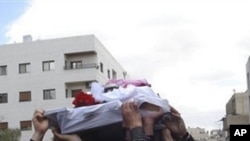In Syria, the regime of Bashar al-Assad is determined to stifle the voices of the Syrian people who are calling for freedom, democracy, and an end to authoritarian governance. The Assad regime has shown its willingness to shed vast amounts of Syrian blood, and to defy the opprobrium of the international community as it clings to power.
Human rights monitors report that the government is using bullets and mortar shells, arbitrary arrests and torture to crush the pro-democracy demonstrations that have swept across Syria.
"The Syrian government is clearly trying to shatter the will of those peacefully expressing dissent by shelling them, firing on them and locking them up," said Salil Shetty, Amnesty International’s Secretary General. Estimates are that close to 600 Syrians have been killed since peaceful demonstrators first took to the streets in March. The National Organization for Human Rights in Syria said, in the last week alone, at least 1000 people have been detained in a cross country sweep by government security forces. Human Rights Watch reports wide-spread torture of detainees.
In the face of such brutality, the United Nations Human Rights Council passed a resolution condemning the Syrian government for "its lethal violence against peaceful protesters" and urged the Assad regime "to immediately put an end to all human rights violations." The Council also requested the U.N. High Commissioner for Human Rights to "urgently dispatch a mission to the Syrian Arab Republic to investigate all alleged violations of international human rights law."
U.S. Secretary of State Hillary Clinton said support for the resolution "unequivocally indicates that the use of force by the Syrian government to quell peaceful political demonstrators is unacceptable."
On April 29th, the United States announced a new round of sanctions on Syria, freezing the assets and property of three Syrian officials, including the director of Syria's intelligence service, as well as a cousin and brother of Bashar al-Assad. The U.S. also sanctioned Syria's intelligence service itself and Iran's Quds force, a paramilitary division of Iran's Revolutionary Guard Corps, which was designated by the U.S. for providing material support to the Syrian government to crush dissent.
Secretary of State Clinton said the United States "continue[s] to condemn in the strongest possible terms the absolutely deplorable actions that the Syrian Government is taking against its own people. The violence must end immediately, and we are conveying that both bilaterally and multilaterally to make it absolutely clear what is expected of the government."




